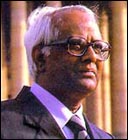 Diplomats tend to retire and fade away. But it is in his later life that new National Security Advisor, Jyotindra Nath (Mani) Dixit, has flowered.
Diplomats tend to retire and fade away. But it is in his later life that new National Security Advisor, Jyotindra Nath (Mani) Dixit, has flowered.
At just around 5 feet above ground level, Dixit's geniality, charm and inexplicable dress sense -- at one stage after retirement, he was seen wearing a mustard safari suit embellished with white stripes until his wife Anu hid it -- was always legendary in the foreign service.
But it is after he left the service that all the worst-kept secrets of the Indian Foreign Service have started coming out in his a-book-a-year (two, if possible) project that has yielded nearly a dozen books on the various troubled phases of Indian diplomacy that he's presided over.
Dixit joined the service in 1958 and shot to fame in the 1970s when he was posted to the Indian mission in Bangladesh during the war. He was picked by Prime Minister Indira Gandhi to do what a former diplomat described as "her oral kaam" just when the war had ended and Bengali nationalism was morphing into Bangladeshi nationalism.
Bangladeshis say Indira Gandhi's advice to Mujib ur Rehman to not attend a meeting of the Organisation of Islamic Countries was misunderstood by the newly-independent nation as interference in its sovereign affairs. Relations between the two nations went into a downward spiral despite Dixit, which is where they've been ever since.
Dixit served in Afghanistan and Pakistan during eventful years. But he will be best remembered for his stint in Sri Lanka where he was High Commissioner when the Indian Peace Keeping Force was sent there.
In the drawing rooms of Colombo 7, the best address in the city where both J R Jayawardene and Sirimavo Bandaranaike lived, he was regarded with a mixture of awe, fear and hate.
Newspaper columnists referred to him as the Little Viceroy. The last word has yet to be said on exactly what the Indo-Sri Lanka accord achieved, because Indian patriotism and Tamil chauvinism get in the way.
Dixit was a much-sought after advisor in the BJP-led National Democratic Alliance government, until he made a somewhat abrupt break with it. When midway between the NDA's tenure, it looked as if Sonia Gandhi was about to form a government, Dixit issued a statement in her favour.
That embittered the NDA and Atal Bihari Vajpayee himself told Dixit to hold on, that a great future awaited him. Rather than wait, Dixit winged away to the Congress and became vice chairman of the external affairs cell, heading the one-member think tank on national security. In this, he was more prescient than all the other professional politicians on the horizon.
In the intervening years, Dixit has been through several personal tragedies. He lost his gentle, wonderfully-talented son who was a teacher of western classical music in the Czech Republic.
And friends and contemporaries with whom he shared a warm relationship have passed on before his eyes. An emotional and passionate individual himself, all this has taken its toll.
But now the gleam is back in the eye. When it comes to securing India's national interest, scruples mean nothing to Dixit. So all those who are waffling on about continuity and change in India's foreign policy should brace themselves for a change. There will be now be a twist in the tale.





